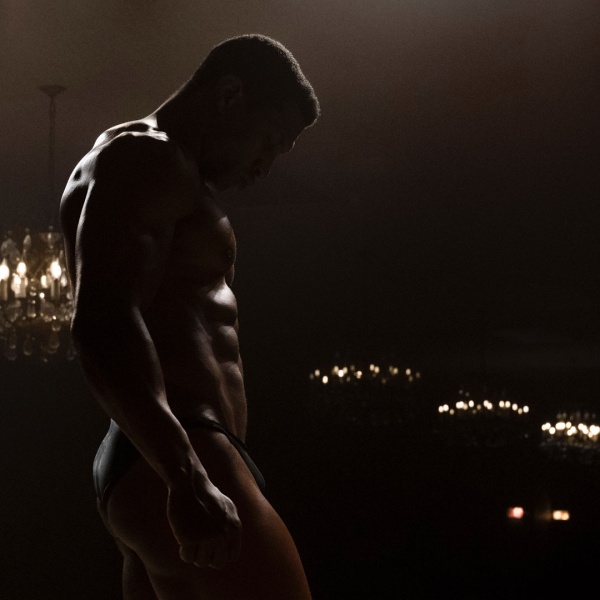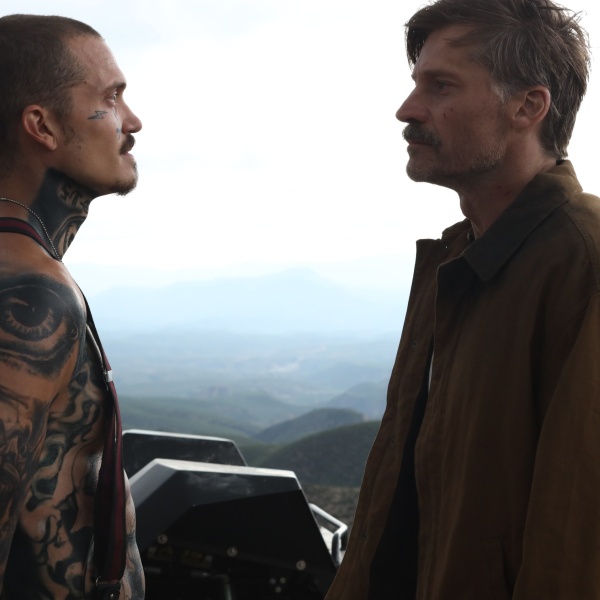“Max leaps into someone’s eyes as they are jerking off whilst Max thrusts into him.”
OK, maybe that’s not verbatim a line from Finnish writer/director Mikko Mäkelä’s “Sebastian” screenplay. That’s Mäkelä demonstrating how specific his script was about the gay sex he wanted to make happen onscreen. This provocative drama, a Sundance 2024 premiere, stars newcomer Ruaridh Mollica as Max, a 25-year-old writer who submerges himself in London’s underground world of escort services in order to research a novel about a sex worker. Posing as his protagonist, Max accepts money, travel, and more from older men in exchange for on-demand sex in cold hotel beds and elsewhere, sending Max in a spiral the movie shows in explicit terms, and while not shying from the twinky beauty of its lead.
“I don’t think I approached it so much from the point of view of thinking about sexiness, but that is [part of] this journey of sex work from Max’s first moments of exhilaration and hesitation to growing into his confidence and enjoying the sex and then getting to a deeper meaning of it,” Mäkelä, whose last film was the microbudget 2017 gay romance “A Moment in the Reeds,” told IndieWire. “The aim was to approach sex and sex work from a very frank and honest place, not shying away from risks associated with sex work, but also really getting to that place of where we understand that exhilaration.”
Mollica — a sharp-featured, lithe Scottish-Italian who comes to “Sebastian” with just a handful of TV and short film credits — “didn’t know anyone who was as engaged in sex work as directly as perhaps Mikko did,” he said. So research came in the form of talking to friends who’d been on OnlyFans, and watching YouTube interviews with sex workers to find “the most interesting and beneficial people who were post- that phase of having a shame around it, people who had come out to their family about what they were doing, and it was about learning about the joy and the celebration that they had in that line of work.”
The film plops us in media res of a double life Max is already leading — he’s set up an online escort profile and is sleeping with men for money, and for the story, as it were. It’s bringing him closer to the truth in his book, and his editor is pleased with the franker directions of the storytelling, but with that for Max comes waves of guilt and self-loathing. To capture an honest approach to gay sex, the filmmakers and Mollica worked with an intimacy coordinator, a key on-set voice Mäkelä didn’t have the luxury of employing on “A Moment in the Reeds.”

“It was before the position had even been created, and that was a different experience as well because it was just between two people,” Mäkelä said. “With this film, having that intimacy coordinator felt crucial [in] being able to build that trust so quickly. There’s such a cast of characters who do have sex scenes, and some of them might’ve only had one day on set or so.”
Mäkelä wrote the details of every sex scene directly into the script. “I feel like I couldn’t leave them to be choreographed in pre-production or on the day,” he said. “During pre-production, we would have rehearsals which would then help flesh out more detail and build a choreography then to be referred back to on that day that we filmed.”
“They could cultivate a comfort and a relationship with a castmate in 30 minutes. That meant you were so comfortable hugging and kissing,” Mollica said.
The sounds and sensations of those sex scenes will also be familiar to, well, pretty much anyone who’s ever had it, like the repetitious slapping of flesh on flesh when Max takes a guy more his age home from a nightclub. The sex scenes here careen from kinky and wild to sad and bloodless, as Mäkelä shows the whole range of the sexual spectrum for queer men in the 21st century. And the danger of getting too close to your own art.
“I gave details and instructions about that in the sound edit,” Mäkelä said. “’I don’t hear enough slapping’ or ‘it’s a little bit too much here’ … It’s a mixture of foley and production sound, but I’m very particular when it comes to sound design, and in this film, even when I was writing, what I really heard and wanted to juxtapose were those sounds of sex and then the sounds of the city because crafting that urban landscape through sound was very important to the story as well.”
The director added, “It was crucial to give the sex scenes a lot of detail on the page because the dramatic point of the scenes is never really just that the characters have sex, but it’s rather about finding and capturing the specific moments during the scene that communicate something shifting for Max emotionally.”

“Sebastian” is equally attentive to the restless, introspective project of being a writer and the craft of novel-writing, which is often so hard to capture onscreen, where literary critiques and feedback fall flat when rendered off a page cinematically. Here, Max idolizes Bret Easton Ellis, the Brat Pack satirist who popularized American ‘80s autofiction with “Less Than Zero,” also about an aspiring writer tumbling into a demimonde of sex and existential dissolution.
“He was a really interesting touchstone for Max in just the way that he plays with his biography in his work and the way he uses himself and also plays his games with the reader of what’s real and truthful and what’s novel, what’s autobiography,” Mäkelä said. “He’s always been a bit of a provocateur as well, so that’s kind of why I wanted to reference him. What was really interesting about reading [his latest book] ‘The Shards’ in relation to ‘Less Than Zero’ [is] you are reading a novel about Brett, who is writing ‘Less than Zero.’”
“I was already a fan of Bret Easton Ellis’ work,” Mollica said. “It was great to get the insight into that angle of autofiction and where that line does get blurred.” In our interview, Mollica picked up a copy of Bret Easton Ellis’ mocku-memoir “Lunar Park.” “Even on the back of this one, it’s like, ‘All of it really happened, every word is true.’”
Max’s relationship with another older client, the aging bon vivant Nicholas (the great character actor Jonathan Hyde), a bond that abstains from sex altogether in exchange for artistic mentorship, also goes a long way to destigmatize the sameness prevalent in gay culture. In “Sebastian,” we see all shapes and sizes of bodies and age gaps in relationships.

“I really wanted to present a range of clients, of course, and all with slightly different reasons for wanting to hire a sex worker,” Mäkelä said. “We don’t see those representations that often, so that was something that might be challenging to some people as well. But I think there’s such beauty in those contrasts … In scenes with Nicholas, what I wrote in the script was ‘younger skin, touching older skin,’ and there is something I suppose that has been a little bit taboo about that, but I think it was great to explore in the poetry of that touch.”
Since “Sebastian” premiered at Sundance, has played queer festivals globally, and now heads to theaters, it’s certainly opened up new opportunities for the director and star.
“I signed with Range [Media Partners], who are my new American managers, and just through that, my name and my performance are being talked about more, and there’s a lot more opportunity slowly arising over in America, which has been really, really exciting,” Mollica said.
Mäkelä, who directed only shorts before making “A Moment in the Reeds,” said a feature on this scale was actually more of a challenge. “The first film was a microbudget production done in a really DIY, kind of profit-share way, sort of in secret, let’s say, or outside the system. No one knew we were making it, so it was really just about having, finding a group of creatives to come together to tell that story and make that film… It did better than expected, so then it opened the door to getting [‘Sebastian’] in development with the BFI in the UK.”
But, he added of “Sebastian’s” European co-production, “Telling a story like this, which is quite challenging subject material, it’s not so easy to find the people who want to pay for it…It definitely wasn’t easier, but I hope the next one will be.”
“Sebastian” opens in select theaters from Kino Lorber on Friday, August 2.







